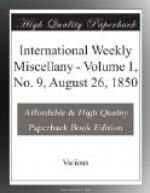“Ahem! Strange, if true,” answered Mr. Bagges. “Eh? Well! I suppose it’s all right.”
“Quite so, uncle. Burn carbon or charcoal either in the air or in oxygen, and it is sure always to make carbonic acid, and nothing else, if it is dry. No dew or mist gathers in a cold glass jar if you burn dry charcoal in it. The charcoal goes entirely into carbonic acid gas, and leaves nothing behind but ashes, which are only earthy stuff that was in the charcoal, but not part of the charcoal itself. And now, shall I tell you something about carbon?”
“With all my heart,” assented Mr. Bagges.
“I said that there was carbon or charcoal in all common lights, so there is in every common kind of fuel. If you heat coal or wood away from the air, some gas comes away, and leaves behind coke from coal, and charcoal from wood; both carbon, though not pure. Heat carbon as much as you will in a close vessel, and it does not change in the least; but let the air get to it, and then it burns and flies off in carbonic acid gas. This makes carbon so convenient for fuel. But it is ornamental as well as useful, uncle. The diamond is nothing else than carbon.”
“The diamond, eh! You mean the black diamond.”
“No: the diamond, really and truly. The diamond is only carbon in the shape of a crystal.”
“Eh? and can’t some of your clever chemists crystalize a little bit of carbon, and make a Koh-i-noor?”
“Ah, uncle, perhaps we shall, some day. In the mean time I suppose we must be content with making carbon so brilliant as it is in the flame of a candle. Well; now you see that a candle-flame is vapor burning, and the vapor, in burning, turns into water and carbonic acid gas. The oxygen of both the carbonic acid gas and the water comes from the air, and the hydrogen and carbon together are the vapor. They are distilled out of the melted was by the heat. But, you know, carbon alone can’t be distilled by any heat. It can be distilled, though, when it is joined with hydrogen, as it is in the wax, and then the mixed hydrogen and carbon rise in gas of the same kind as the gas in the streets, and that also is distilled by heat from coal. So a candle is a little gas manufactory in itself, that burns the gas as fast as it makes it.”
“Haven’t you pretty nearly come to your candle’s end’!” said Mr. Wilkinson.
“Nearly. I only want to tell uncle, that the burning of a candle is almost exactly like our breathing. Breathing is consuming oxygen, only not so fast as burning. In breathing we throw out water in vapor and carbonic acid from our lungs, and take oxygen in. Oxygen is as necessary to support the life of the body, as it is to keep up the flame of a candle.”
“So,” said Mr. Bagges, “man is a candle, eh? and Shakspeare knew that, I suppose, (as he did most things,) when he wrote
‘Out, out, brief candle!’
“Well, well; we old ones are moulds, and you young squires are dips and rushlights, eh? Any more to tell us about the candle?”




